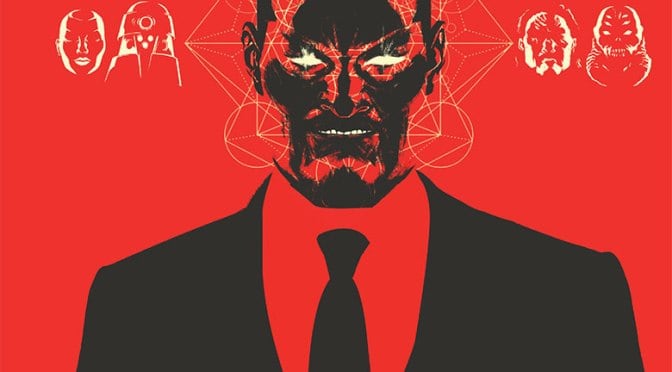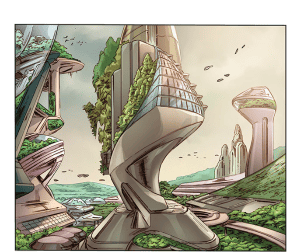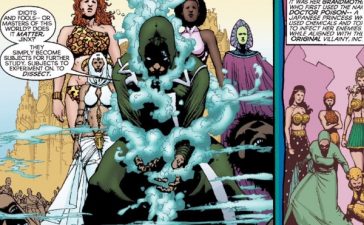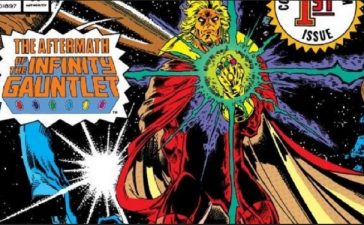
 Imperium #1 by Joshua Dysart & Doug Braithwaite
Imperium #1 by Joshua Dysart & Doug Braithwaite
Last year, Dysart concluded his Harbinger series, setting the stage for his new Valiant project, Imperium. In the mini-series Omegas, Dysart transitioned from the focus on the Renegades to their adversary Toyo Harada. In the process, he radically altered the make-up of the Valiant Universe. Harada, who had long been manipulating world events from behind the scenes, has been exposed for all to see. Despite this turn of events, he refuses to be deterred from his self-appointed mission to save humanity from itself. No longer able to yield influence through his corporation, he seizes part of Somalian territory, declaring it his own sovereign land. From there, his forces shall intervene wherever they see fit for the betterment of all.
The issue opens with a vision of the world which Harada’s actions could bring into being. It is 120 years in the future, and the planet has achieved balance. In place of the slums of Mumbai, sleek space-age towers reach for the sky, which is a cloudless, unpolluted aqua-blue. The buildings are sparsely arranged, leaving plenty of room for lush vegetation. Indeed, even the towers themselves have patches of plant life growing along their sides. A similar view of progress greets the reader upon arrival at Hong Kong Island. Braithwaite’s art invests these opening images with a real sense of wonder.

Traveling from Mumbai to Hong Kong is Darpan, who readers first met as a young man during Harbinger Wars. As a child, Harada rescued Darpan from poverty, and taught Darpan how to control his psiot gift. Darpan possessed the ability to make someone relive their worst moments; Harada showed him how discipline could flip that around, gifting people with their happiest memories instead. In such a way, it is the perfect example of Harada’s vision for the world: taking the cast-off, the spoiled and rendering it good once again. An example of this from the future would be former garbage patches remade as cultivators for food and energy. Humanity, through a dedication to the common good, has overcome the dangers of the 21st Century and built a better world, even as their communities expand beyond their terrestrial origins.

It is an inspiring vision, yet, in the end that is all it is: a dream of the future projected by Harada into the minds of his closest followers. Seamlessly, Dysart returns the story to the present, as Harada readies his troops for their first foray into battle. As is Dysart’s practice, the writer does not hide behind imaginary conflicts or countries, sending Harada straight into the bloody Syrian civil war (Harada has a history of involving himself in that country’s affairs). Such choices give a level of immediacy to the proceedings that a fictional setting would lack. The situation in Syria is too complicated for any author to supply an easy answer, even if it does include super-powered humans. Harada’s entry into the conflict does not come without costs.
What is interesting is which character is the one most attuned to these misfortunes. Harada’s strike force includes a robot designated Mech Major. It is he who emerges as the voice of compassion, calling out his teammates for a lack of proper respect. He also cringes at “Mech Major” insisting that his true name is the much more poetic Sunlight on Snow. This machine has a strong humanity to him, and I look forward to seeing how Dysart develops it further.
All in all, this issue is a strong debut for Imperium, which promises to be a worthy successor to Dysart’s excellent Harbinger.
Cheers
Imperium #1 will be released by Valiant this Wednesday, February 4th.








